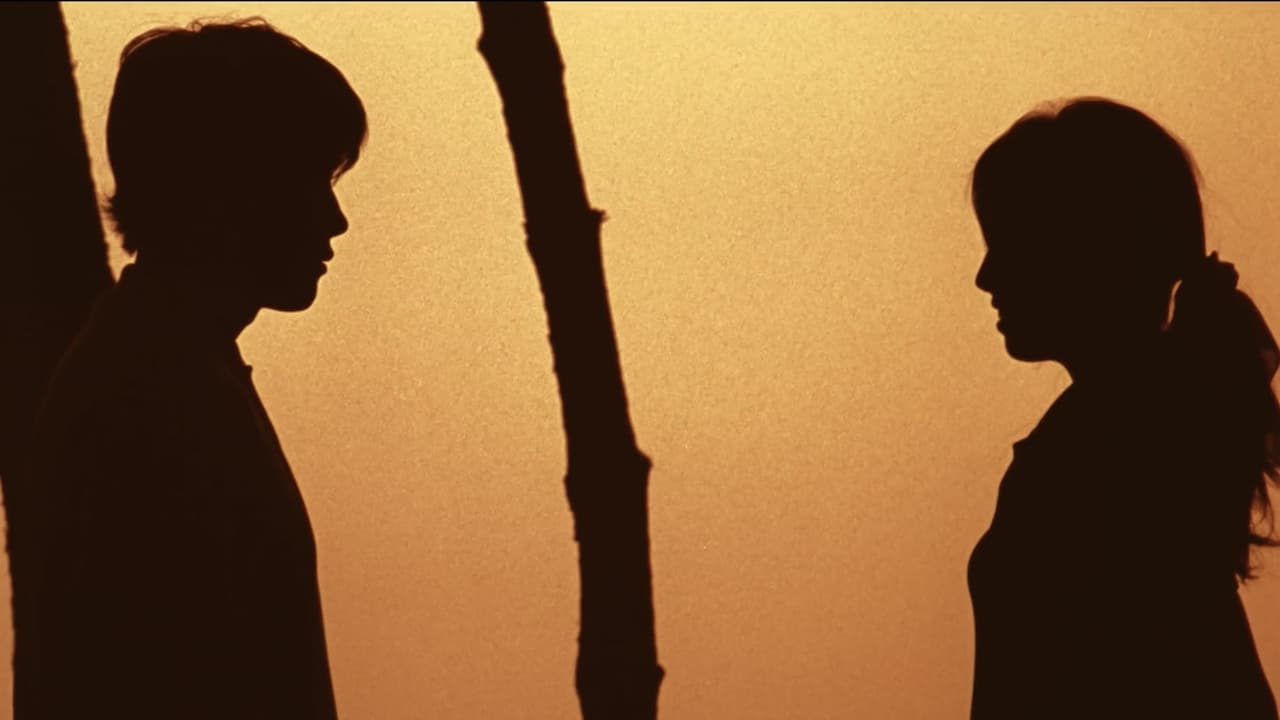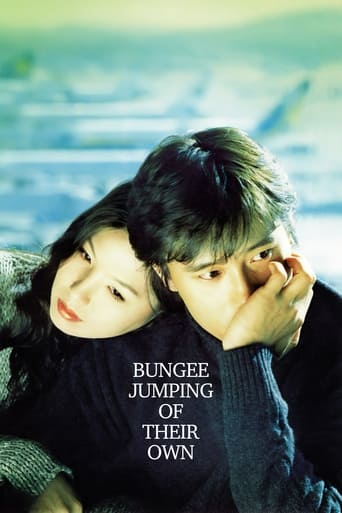

Bungee Jumping of their Own is the debut directorial effort by Kim Daeseung and after watching his other works, I have to say that certain things run through his films. The most prominent is that he has a strong fondness for flashback revelation. Now I could pin this on the writers, but his other two films also have a lot of flashback revelations and two-story elements that it's hard to ignore the connection between the films. The other notable thing is that all of his films boast great photography. Now, Bungee Jumping has a lot going for it, but it doesn't sit well with me because of its themes.The story is divided in two parts, the first in 1983 as we witness the development of a relationship between two college students. The second part is set in 2000 and, for whatever reason, the male protagonist is now a teacher, no longer with his then-girlfriend. The strange thing is that he finds himself noticing similarities between a young male student of his and his previous girlfriend. Unfortunately, to keep writing about this film, I will have to go into spoilers, so skip to the last paragraph for the recap if you don't want to see them.The story isn't actually a mystery, because the conflict has little to do with the fact that the young male student is so similar to his previous girlfriend, but rather how he can accept his feelings for a young male student. The conflict is internal angst within himself as he struggles with his identity as well as the greater struggle with both the student as well as the lines he cannot cross as a teacher (and husband/father as well). The structure of the storytelling is simple. It elides information at times but you can sort of fill in the blanks and so I felt that many of the flashbacks were a little redundant, but I guess in retrospect, they help fill a thematic space via repetition between present and past. Ultimately, the buildup works as it should in a film, leading to a climax and payoff.But, while I went through the expected emotions when watching a decent film, something really ate at me while watching the film and it wasn't the homosexual tensions, but that the underlying ideology, or perhaps lack thereof, of the film's theme really rubbed me the wrong way. Essentially, the film is a self-pitying tragic ode to "The One" theory of love with reincarnation and gender swaps thrown into the mix. Both main characters "know" that they are to be together and are torn apart by the circumstantial death of the woman. The conflict that happens later when she is reborn as a male is mostly internal and dealing with identity issues. This might be fine for those who believe is the "love the soul" concept that floats among some LGBT folk, but it doesn't even serve that audience because the two commit suicide in the end in order to reincarnate in more favorable heterosexual relationship. It's a "woe is me" tale of destined love separated by... destiny! Now, I have a problem with "The One" theory, in that there's just one person out there for everyone, but at the same time, I can watch a good movie with that as an underpinning ideology and be okay with it. The problem here is that Bungee Jumping is so wishy-washy about it all, disservicing the queer community that it, on surface, seems to be trying to relate, but also is inherently selfish in its ideology. The protagonist causes massive amounts of pain to his students, his wife (and presumably his daughter) and then runs away with the boy to commit suicide with no regard for the consequence on those around them. In a story about love, seeing such a thing isn't so much tragic, as the circumstances weren't something they could overcome or failed trying to overcome, but rather, they just escape with no consideration of who it might affect. And with such a terribly hypocritical undercurrent, it's hard to find myself liking this movie on that level.That's not to say it's a bad film. It's actually very well crafted as far as a melodrama is concerned. It doesn't wallow in sentimentality, does a great job at presenting the romance and the resulting conflicts and is really great to look at. It builds up your emotions and lets you go just as a melodrama should. I certainly found myself drawn in and affected at the end. Technically, the film is more than proficient with solid performances by the leads (and a couple supporting characters lend a lot to the film as well), wonderful design and costuming. Beautiful photography. But, still, the problem at the thematic core really prohibits me from loving this film. I don't think everyone will see it as a flaw and the rest of the film is so well put together that I can't call it a failure. But, I can't say I loved this otherwise proficient and even risk-taking example of mainstream Corean melodrama. 7/10.
... View Morehi Arnold Yim - before you mentioned it, I've never looked at homosexuality in that way... you have indeed enlightened me! I'm Korean myself too, and I come from a very conservative family who aren't open to homosexuality. I know how frustrating it could be for someone to be both Korean and homosexual. kind of like marrying a Caucasian instead of a Korean! ;)This is in fact one of my favourite movies, because its theme deals with true love and reincarnation, and has a sad/happy ending (they commit suicide in order to be born again in different genders, so that they can be accepted by the society). Lastly, it has a tragically beautiful piece by Shostakovich, 'misidentified for years' as the "Jazz Suite Number 2", according to Wikipedia.
... View MoreBUNGEE JUMPING OF THEIR OWN (Beonjijompeureul Hada) Aspect ratio: 1.85:1Sound format: Dolby DigitalA high school teacher (Lee Byung-hun) suspects that a teenage boy (Yeo Hyun-soo) is the reincarnation of a girl he loved and lost 17 years earlier - and begins to fall in love with him...The Korean movie renaissance continues apace with this extraordinary film from debut director Kim Dae-seung, working from Ko Eun-nim's equally extraordinary script, which tackles the universality of love in all its myriad forms. Hoping to spring a surprise on the film's notoriously conservative domestic audience, the distributors omitted virtually all references to the 'gay twist' from advance publicity materials, promoting the movie as a story of enduring love (the opening section is no different from dozens of other romantic dramas produced in SE Asia every year), headlined by some of the country's most popular actors.Korean superstar Lee Byung-hun (JOINT SECURITY AREA) is utterly charming as the beleaguered protagonist who stands to lose his friends, family and livelihood because of a sudden, inexplicable identity crisis (he isn't 'gay' in the true sense of the word, he's simply found his soulmate in an unexpected place), and he makes a startling transition from gauche youth to confident adult, touched by eternity; his emotions are palpable, and deeply affecting. Lee Eun-ju is strong in a largely thankless role as the woman who captures Lee B-H's heart (sadly, the actress took her own life in February 2005), while rising star Yeo (BIRTH OF A MAN) holds his own as the young man caught up in circumstances beyond his control.A romantic melodrama in the true sense, Kim's remarkable film balances magic and realism with exquisite grace (look out for the 'waltz at sunset' sequence, guaranteed to warm anyone's cockles), though the climactic descent into darker territory leads to an unexpected finale which is both sad and liberating, all at the same time. Unfortunately, the film has been saddled with an appalling English title which makes it sound like some kind of comedy, and prospective viewers are urged to look beyond this minor blemish. Brave, emotional, and played to perfection by a sterling cast, this is transgressive cinema at its most compelling.(Korean dialogue)
... View MoreThis love story is quite engaging. It portrays relatively simple, but very touching characters. There is an aura of innocence and naive charm that transpires.The story itself is sweet. It deals with the themes of typical teenage romance (teasing, awkwardness, tension, comfort, confusion, initial steps into sexuality) and of deeper love (transcendence, bond, implicit connection, sharing, understanding).The begging is excellent and shows Seo In-woo and In Tae-hee fall in love and figuratively leap together towards the uncertainties of life. They form a bond of heart-felt love, trust and appreciation. The cinematography and the dialogue of their sequences in the rain are magnificent. The right mixture of simple and grand. They're intimacy is also very well expressed and we feel like we almost fell in love anew as a viewer. Quite marvellously done.After this exquisite prelude, the story then fast-forwards to a few years in the future, when Seo In-woo is now a professor. Little by little, we start to understand what has happened during the time gap and how the professor's inner world is resurfacing. It slowly comes back in a very interesting, non-conventional and unpredictable way.While the characters remain simple, even if in conflict, the story then intensifies and reach a level of complexity and maturity that is truly exemplary.The cinematography is again allowed to shine when we leave the classroom and even the interior scenes in Seo In-woo's home (or the earlier motel scene for that matter) are perfectly shot. Calculated, warm and poignant. The landscape, the window shots, the contrasts of light and colours are all top-notch. Picturesque. Incredible craft.The dialogue is also very perky, often funny, and keeps the story moving along with ease. When it's not funny, it's deep and intense, allowing the actors to shine.The resolution of the movie is at once unnerving and soothing. Unbelievable, but also fitting and true. We realize that it could not really have been otherwise. We are not sure if we approve or not, but we can somehow nevertheless understand. Life is also as such: we don't always agree with it, but in the end we have to accept it.
... View More